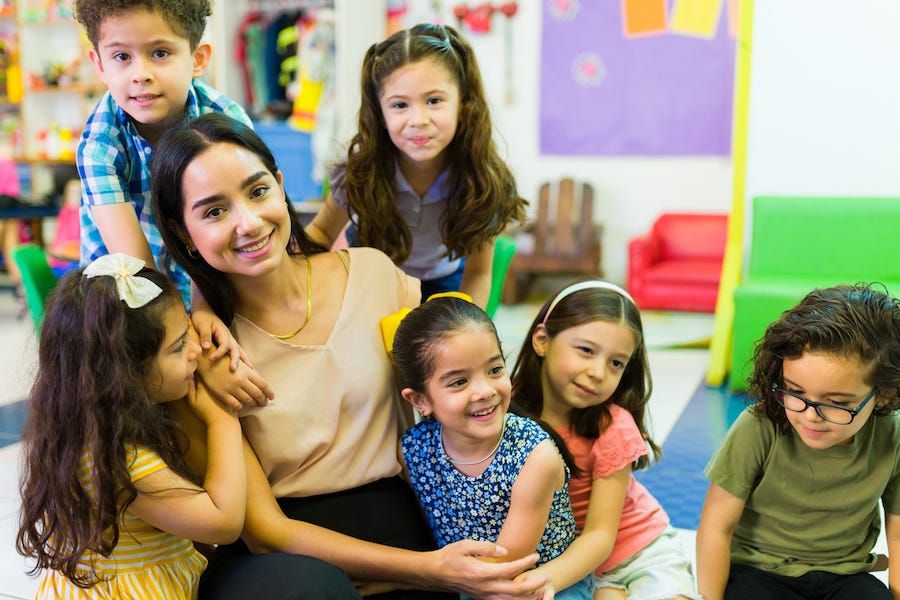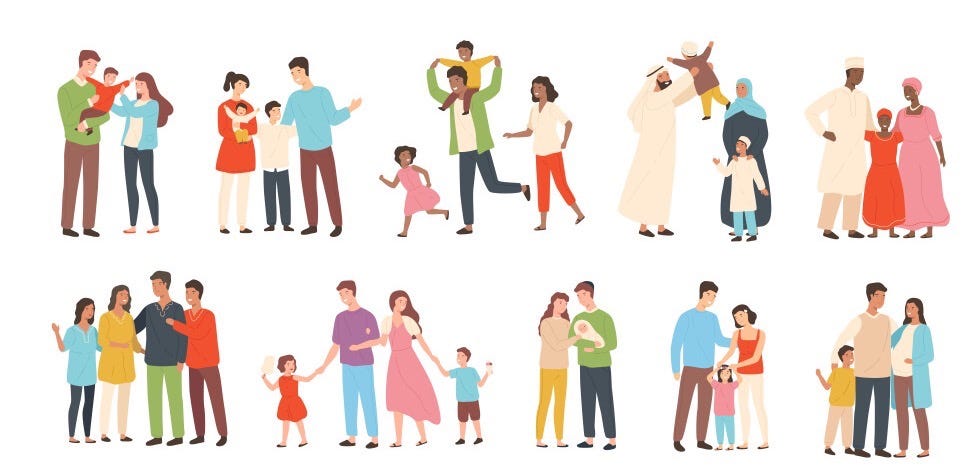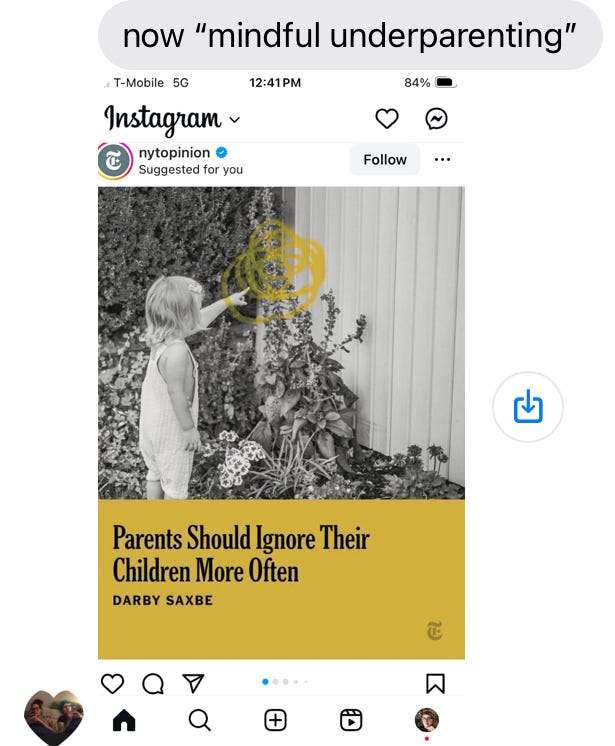Happy Families Are (Not) All Alike
On child-rearing trends and pressure— and why I hesitate to give “advice” here
In my Substack bio, I list my qualifications as an ‘expert’ in early childhood: a Master’s in Early Childhood Education, over ten years as a head teacher in various play-based preschools across Brooklyn, and certifications in Newborn Care and Kids Yoga and Mindfulness. I was previously a full-time nanny for nearly a decade and co-ran a delightful play-based art and yoga summer camp with a dear friend for several summers, among many, many, many other child-centered things.
I’ve always been “good with kids,” even when I was a kid myself. And now, as a mom, I’m right there in the emotional and logistical trenches of raising these wild animals (who somehow live in my house??) into—oh my god, I hope one day—kind and civilized adult human beings.
For my schooling, my professional development, and my own personal interest, I’ve read extensively about child-rearing, child development, and all child-centered how-tos, why-tos, and overall best practices. I’ve also gobbled up basically all of the buzzy motherhood memoirs, novels, nonfiction bestsellers, think pieces, hot takes, tweets, Substacks, and TikToks until my eyes crossed and brain melted (and I still go back for more!).
I have significant experience and knowledge in this field, yet whenever I consider writing something that even remotely resembles advice, I have a viscerally negative reaction—I simply don’t want to do it..
After all, every happy family is NOT alike.
I’m of course cheekily referencing Tolstoy, whose famous opening line in Anna Karenina is, “Happy families are all alike; every unhappy family is unhappy in its own way.” To that, I say: Tolstoy clearly wasn’t a preschool teacher, or he would know that isn’t true!
You see, as a preschool teacher, I’ve had the privilege of working with families of all shapes and sizes—two-parent, single-parent, and those where grandparents, aunts, uncles, friends, and neighbors step in like superheroes. I’ve worked with traditional ‘mom-and-dad’ families as well as a wide variety of LGBTQ+ families. I’ve worked with families that are large and boisterous with an overflowing subway car of siblings, and other families that are smaller, tight-knit, and self-contained. Some parents work all day running million-dollar companies, some spend their days running after wild toddlers, and a few somehow manage to do both at the same time (and maybe haven't slept since 2015?). I've worked with hippy-dippy families where everything is farmer-market-organic, and others where fruit gummies and Goldfish crackers count as a successful meal. Some families spend their weekends outdoors from sunrise to sunset, while others prefer cozy, pajama-clad board game tournaments and family movie marathons.
I’ve seen it all—and everything in between.
But here’s the one thing they all have in common: they all love their kids fiercely and are doing their absolute best to make the right choices for their children, for themselves, and for their entire family unit.
In my experience, that is just FACT.

One of my favorite parts of the school day is morning drop-off, mostly because I’m an insufferable morning person who thrives on new beginnings, even if it’s just a random Thursday morning in March. I just always look forward to that first little hello from my kiddos, in their utterly adorable outfits, their tiny hands gripping street-picked dandelions or something equally as sweet. They’ll often share stories I can only half-understand, about their sibling, or neighbor, or pet, or breakfast, or a show they just watched. I eat them all up!
And then I get to chat with their grown-up. Oh, how I love to chat. I love hearing about what’s going on in their child’s life—the good, the tricky, the funny, and the sweet. I hear about exciting vacation plans and long-awaited visits from extended family. We discuss new babies, new pets, and new homes. We commiserate over sleep struggles, toileting troubles, and the overwhelming wave of little-kid illnesses that always seem to strike at once. We laugh about the endless parade of puzzling toddler behaviors of which there are so many.
I cherish being part of those conversations— and offering help when asked for it.
I’m always happy to share what I know, and after working with so many children and families, I’ve learned quite a bit:
I know all too well the maddening sleep phase that kicks in around 2.5 years old, when they still need a nap during the day but then won’t fall asleep at night until 9 p.m. because of it.
I’m all too familiar with their ever-shifting food aversions, and the challenge of feeding these little monkeys who seem to survive on solely on cheddar bunnies, apple slices, and macaroni and cheese (if you’re lucky!).
I completely understand the powerful grip a “transitional object” can have on a child’s—and their parent’s!—emotional well-being. (One of the sweetest examples I’ve seen was a little girl in my class last year who would not let go of her mom’s pajamas, clutching them tightly all school day long. She called them her “mamas.” Her mama’s pajamas! It was adorable.)
I know all about the boundary-pushing, meltdown-heavy phase that kicks into high gear around age 3—when 'no' becomes their favorite word, full-blown meltdowns happen over the wrong color cup at breakfast, and every limit, no matter how small, is just begging to be tested—
And I’ve got tips and tricks to help!
From guidance on what is developmentally-appropriate, to specific language to use, to tweaking daily schedules and rhythms, I can usually offer a strategy, a concept, a book, or an empathetic story related to just about any challenge. Sometimes all I can say is, "I’m sorry it’s so hard, but this is totally common and age-appropriate." And when needed, I can also offer guidance and support if something does seem concerning, or if it requires a closer look.
I’m happy to share this advice when asked, because I can tailor my suggestions to fit each family’s unique situation.
A key part of a preschool teacher’s job is building relationships with families, and as we do, we gather as much context as possible to support them effectively. Before offering anything, we ask ourselves: Is this child an only child, or do they have siblings? Are they the older sibling or the younger? What else is going on at home? What are we noticing in the classroom—socially, emotionally, cognitively, or physically—that could provide insight? What are the family’s non-negotiable priorities, and where is there room for flexibility? For me, understanding these details helps me give advice that truly fits their needs.
And believe me, I’m always happy to share advice. I’m a Virgo eldest daughter, for crying out loud—I have ideas, I promise you!
However, on this platform, I do not feel comfortable offering anything that might look like a one-size-fits-all solution. I just don’t believe those exist in any hard and fast way.
I think of my own experience as an example. As I’ve written previously, I bedshare with my kids. Our oldest was a true velcro-baby and wouldn’t sleep any other way. It wasn’t our original plan, but it works wonderfully for us. However, I would never claim, “This is the only way to sleep as a family,” because I know that simply isn’t true.
Context is everything!
Case in point: when my son was around 18 months old, I knew he was waking up to nurse more often than necessary simply because he was so close to me in our bed. But I didn’t mind. Why? Because at the time I was working in a morning-only preschool, and was able to take my afternoons off to rest when needed. If I had been working full-time with long, busy, packed-to-the-brim days, I can only imagine how challenging those extra wake-ups would have been and how I may have looked for alternative sleep solutions. I had the flexibility at the time to maintain the status quo.
I often reflect on those early weeks and months, where we leaned into bedsharing because of our son’s preference. I saw how specific the math of that decision was to us—his needs, our personalities, our schedules, energy, and lifestyle at the time. It was a real eye-opener for me and deepened my appreciation for the fact that every family operates with its own unique blend of internal logic, priorities, temperaments, abilities, work schedules, and support systems. There are infinite pathways to creating a happy family; there can never be just one answer.
Ultimately, we all make it work in our own unique ways, with all the requisite detours and route changes along the way.
In addition to all of that, I simply don’t want to add anymore “shoulds” to anyone’s plate. Isn’t there enough already?
Recently, my friend texted a screenshot of the New York Times article titled, “Parents Should Ignore Their Kids More.” She added, “Now it’s mindful underparenting,” with an implied eye roll. I immediately got her point—here’s yet another thing parents “should” do. Another piece of chatter-class advice, another expectation to dissect on coffee dates and at dinner parties. Another goal to aim for, fall short of, feel guilt over, and then try again.
Funnily enough, I actually agree with this particular “should” to a large extent (constantly centering your kids isn’t enjoyable or helpful for anyone), but that’s not really the issue. I think we’re all feeling a bit worn out by the persistent drumbeat of parenting pressure, which, at a certain point, can start to feel like this:
Or sound like this:
The cycle of advice always seems to swing from one extreme to the other. Here are some examples just from my own personal experience—
When I was nannying in the Williamsburg/Greenpoint area in the late aughts, attachment parenting was all the rage—bedsharing, babywearing, and even elimination communication right on the city streets! Many parents felt immense pressure to conform, which was not only stressful but also unrealistic—especially for families where both parents worked outside the home. Then came the 2010s, bringing with it the rise of sleep training gurus and influential doctors who advised leaving 2-month-olds alone in their cribs for 12 hours a night. One minute it’s all about closeness and connection, and the next it’s about leaving your 8-week-old alone all night. Talk about whiplash!
Then came the recent wave of Gentle Parenting. While the emphasis on emotional regulation and thoughtful discipline was well-intentioned, the philosophy got muddled, and the pressure it placed on parents was intense. Suddenly, we found ourselves having interminable discussions with our thankfully-cute-but-still-irrational little tyrants (that we often needed literal scripts for!). Gentle parenting demands a constant reservoir of emotional patience and engagement, which can be truly exhausting. So, it’s no surprise that The New York Times is now pushing “mindful underparenting.” (Side note: I remember hearing about this approach years ago as “benign neglect.” What a rebrand!)
And the pendulum swings again.
It’s incredibly difficult for parents to take on yet another “should” in a society that offers them virtually no support: no federally guaranteed paid parental leave, subpar maternal healthcare, no universal childcare, no universal access to free, high-quality preschool, a scarcity of flexible work schedules, and so on and so forth until we all fall into the void. It’s no wonder parents are now so stressed it’s considered a national public health crisis!
There are approaches I genuinely believe in that help foster healthy, happy children and families, and I do plan to write about them here. These include encouraging more downtime, reducing or being more intentional with screen time, and spending more time outdoors in nature. I’ll also emphasize the importance of allowing kids to engage in free, open-ended, hands-on, child-led play, without stressing too much about academics at an early age.
That said, my goal isn’t to offer prescriptive advice. Instead, I want to share what I’ve learned from a lifelong passion for raising kind, resilient, and curious kids—while always recognizing that there are countless ways to build a happy family, and that we’re all doing the best we can with what we have.
Won’t you come along for the ride?!
What do you think? Are you burnt out on advice, too? Or do you want me to tell you what to do? (I’m only half-kidding.) Let me know!












So so incredibly and thoughtfully said
👍🏼👍🏼👍🏼👏🏼